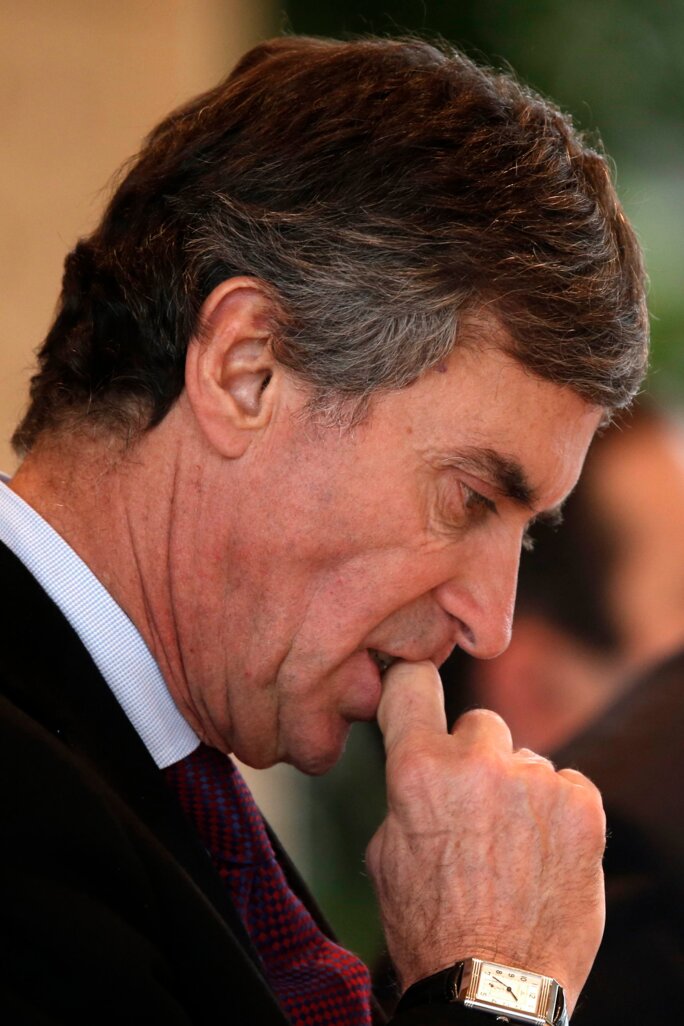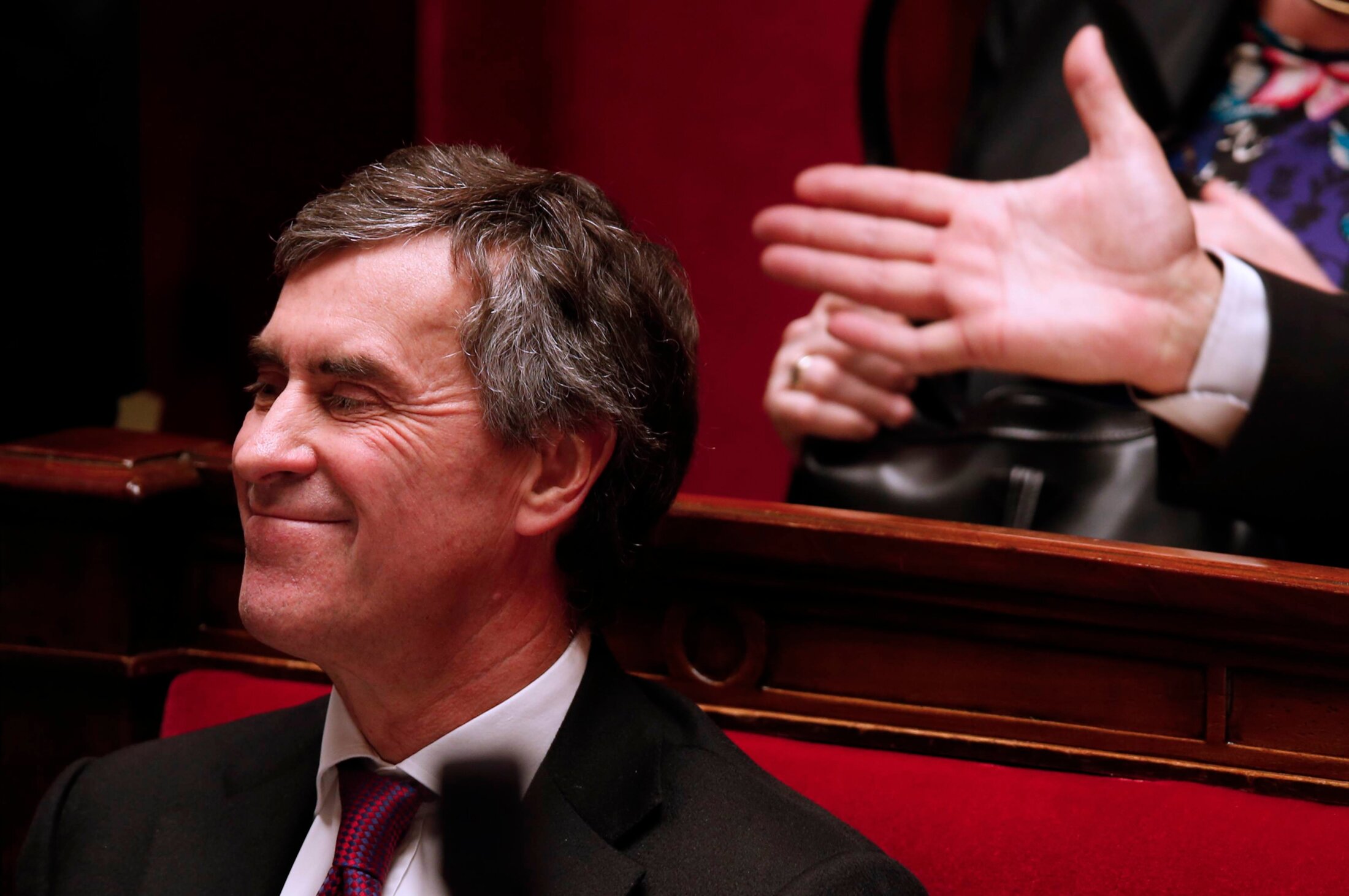Gilles August had served as Jérôme Cahuzac’s lawyer ever since Mediapart first revealed, on December 4th 2012, that the then-budget minister, who himself had announced in November a crackdown on tax fraud, held a secret foreign bank account.
“One cannot purport one thing, and then another,” he told Mediapart on Tuesday, following Cahuzac’s confession to holding the account, after months of denial and lies before parliament and the press. “I no longer represent Jérôme Cahuzac. I defended his innocence. I would no longer be credible if I now had to defend the contrary.”
Cahuzac’s current lawyer, Jean Weil, told Mediapart that he took up the defence of his new client at the beginning of last week.
There was a rapid succession of events that led to Tuesday’s bombshell announcement by Cahuzac himself that he had, “for some 20 years”, held a secret bank account abroad. At 1.30 p.m. the Twitter account of the investigative and satirical weekly magazine, Le Canard enchaîné, announced a scoop in its weekly edition that hits the newsstands every Wednesday.
The message (see below) read that Cahuzac was ready to confess to the magistrates leading a judicial investigation opened into evidence published by Mediapart that he holds a secret foreign bank account that he did, indeed, have undeclared accounts in Switzerland and Singapore.

Two hours later, French rolling news TV channel BFM TV reported that the former budget minister had arrived at the offices of the two magistrates, Renaud Van Ruymbeke and Roger Le Loire, in charge of the investigation into his, until then, suspected secret account, which was opened last month into “money laundering of tax fraud”.

Enlargement : Illustration 2

But in fact, Jérôme Cahuzac had written to the two magistrates on March 26th, just one week after his resignation as budget minister, explaining that he wished to confess – as he explained Tuesday in a statement on his blog.
That statement, issued after his Tuesday meeting with the magistrates, said that he had “confirmed the existence of this account to them, and I informed them that I have already sent the necessary instructions so that all of the assets held in the account, which had not been added to for some dozen years, amounting to about 600,000 euros, be transferred on to my bank account in Paris.”
In that statement, Cahuzac writes of “the account”, in the singular. Yet according to the initial report by Le Canard enchaîné, he was apparently ready to recognise the existence of not one, but two accounts in Switzerland, and another in Singapore, where Mediapart has already indicated that, according to evidence it has found, he later transferred part of the funds in the Swiss account as of 2010.
'It’s a book-entry process, pure and simple'
After having revealed the existence of Cahuzac’s undeclared account with the UBS bank in Switzerland, Mediapart published the audio recordings of a conversation during which he, while at the time fighting municipal elections in south-west France, spoke directly about the existence of the account. Cahuzac was at the time standing in local municipal elections in the town of Villeneuve-sur-Lot, in the Lot-et-Garonne département (county).
The conversation was recorded at the end of the year 2000 on an a voicemail machine belonging to Michel Gonelle, a barrister and former conservative UMP party mayor of Villeneuve-sur-Lot, a conservative party rival of socialist candidate Cahuzac.
Shortly before the recording of the conversation began, Cahuzac had made a phone call to tell a person close to him that he had obtained the agreement of the then-interior minister, Daniel Vaillant, to make a special visit for the opening of a new police station in the Lot-et-Garonne.
After hanging up, he began a conversation in his office with his investment advisor, Hervé Dreyfus. To all evidence unknowingly, he at some point activated the redial button on his phone. The call was picked up on the voicemail machine which recorded the conversation in which Cahuzac speaks openly with his advisor about his account with UBS.

Enlargement : Illustration 3

The recording lasts for almost four minutes. During the conversation, which police forensic experts subsequently validated as genuine, Cahuzac can be heard saying: “It pisses me off to have an account open there. UBS is not necessarily the most hidden of banks.”
His advisor Hervé Dreyfus is, since 1994, a partner with Swiss banker Dominique Reyl. Dreyfus, a representative of the Reyl group in France, now appears as a key figure in the investigation into Cahuzac’s foreign account, or accounts, led by judges Van Ruymbeke and Le Loire. Unconfirmed information received by Mediapart over recent weeks suggest that he may be responsible for the tax avoidance management of a number of French company directors, politicians and non-professional individuals.
According to information published last week by Paris Match, and about which Mediapart has obtained confirmation from credible sources, the firm Reyl & Cie took over management of Cahuzac’s secret assets, hidden in UBS bank accounts in the early 1990s, as of the beginning of the last decade. Mediapart understands that this involved camouflaging the real identity of the owner of the hidden funds, who was of course Jérôme Cahuzac.
The firm Reyl & Cie obtained its licence for banking activities in November 2010.
As Cahuzac can be heard on the recording dated 2000, he suggested to his investment manager: “Above all, in a certain way, the assets stay with UBS and we can manage them from here. It’s a book-entry process, pure and simple.” (Click here for the audio recording and transcript)
It was in early 2010, when Cahuzac was about to take up his appointment as president of the French parliament’s Finance Commission, that the funds in his secret Swiss account were transferred, via complex financial offshore structures in Singapore, while still remaining with the UBS.
Unanswered questions
Despite his sensational confession on Tuesday, numerous questions remain concerning Jérôme Cahuzac’s secret account. Suspicion over the existence of Cahuzac’s secret Swiss account was the subject of an internal report prepared in June 2008 by tax inspector Rémy Garnier, who was based with a regional tax office in south-west France. At the time, the French budget minister, under Nicolas Sarkozy’s conservative government, was Eric Woerth, who is currently placed under formal investigation in a judicial probe for his role in suspected illegal political funding of Sarkozy’s 2007 election campaign and for influence peddling.
Now retired, Garnier was subsequently reprimanded by his departmental managers, to whom the report was addressed, for having consulted Cahuzac’s tax details without proper justification. He did so by entering an internal tax authority computer programme called Adonis.
Why did Eric Woerth not follow up Garnier’s request for an enquiry? That question is joined by others: just how much money transited through the secret accounts of the former minister? Where did the funds that were placed into the accounts come from – from Cahuzac’s hair transplant clinic or from French pharmaceutical companies, for whom he acted as a consultant during the 1990s, or both?
Jean Veil, Cahuzac’s new lawyer, who replaced Gilles August, told French press agency AFP that the funds in his client’s secret foreign account “have not been added to since 2001 and the essential part of these revenues came from his activity as a surgeon and, in lesser part, from his activity as a consultant”. The latter referred to Cahuzac’s activity as an advisor for pharmaceutical companies.
Veil said that the transfer of the sums kept in the Swiss account were transferred to Singapore in 2009, and not 2010 as Mediapart first reported. He underlined that most of the potential criminal offences that the former minister is accused of are now “mostly” non-prosecutable because of the statutory time limit which prevents tax authorities from investigating fraud that dates beyond a certain number of years.
Veil gave no precise indication of when Cahuzac’s hidden accounts were first opened. However, if this was between 1988 and 1991, when he served as a senior member of staff for the then-health minister Claude Evin, with the special task of concerting policies on drugs, more questions are raised, including whether drugs companies may have paid Cahuzac for undeclared services. This leads to the second question as to whether, throughout this sorry affair, Cahuzac’s denials were made to protect himself or also other interested parties.
There is also an additional question regarding the possibility of a political cover-up. According to a report in last week’s edition of Le Canard enchaîné, the interior ministry informed President François Hollande during the Christmas holiday period that the recording, first revealed by Mediapart early last December, of Cahuzac’s conversation in 2000, when he openly discussed his Swiss bank account, was authentic.
When a full-blown judicial investigation of the evidence that Cahuzac had a secret foreign bank account was opened in March, several members of the French government rallied behind the defence of the then-budget minister. Speaking on French radio France Inter on February 7th, French finance minister Pierre Moscovici suggested that a request filed by French investigators to the Swiss authorities for information about any account eventually held by Cahuzac in Switzerland was met with a negative reply. However, according to a judicial source who spoke first to news agency Reuters then French weekly magazine Le Nouvel Observateur, the “Swiss information is open to interpretation”, and no journalist was ever given access to the Swiss response.
-------------------------
English version by Graham Tearse


